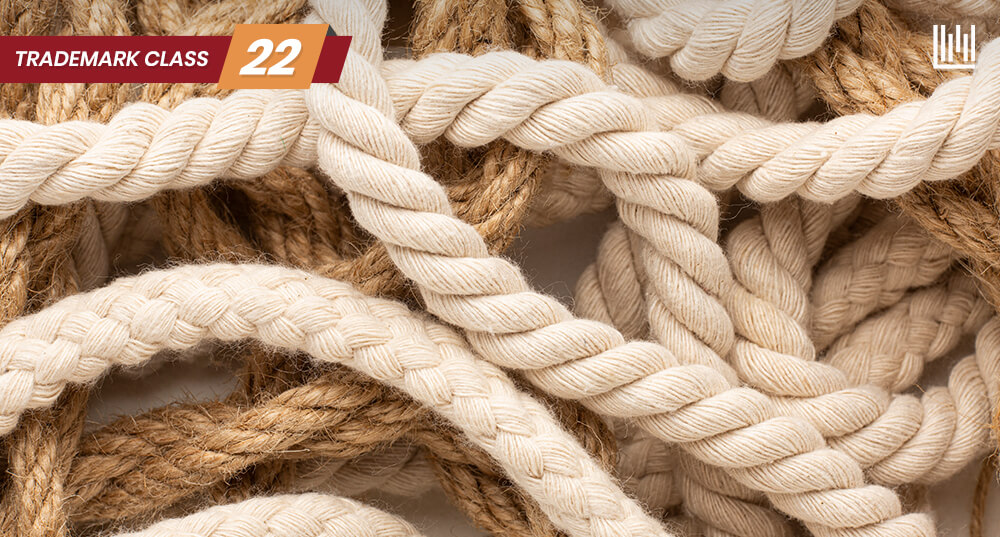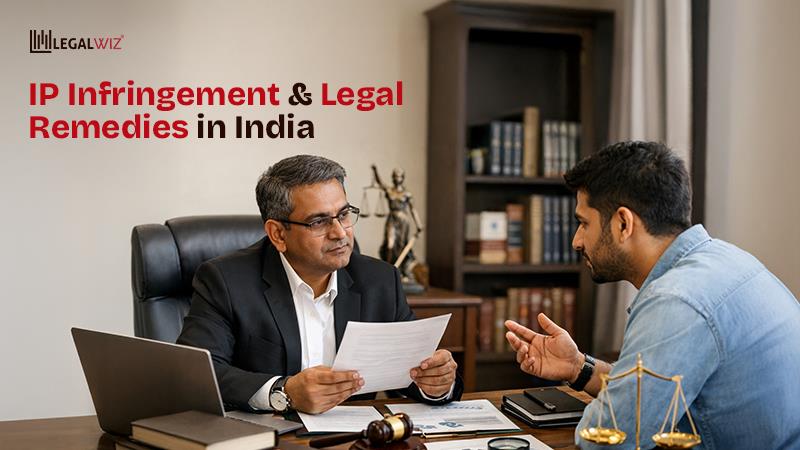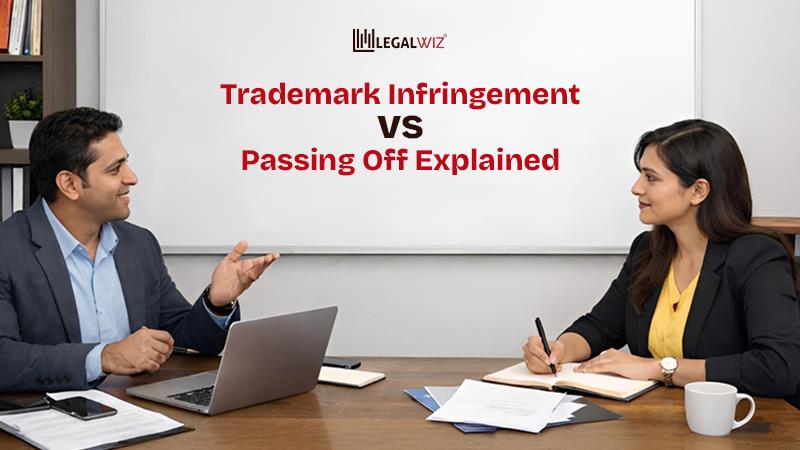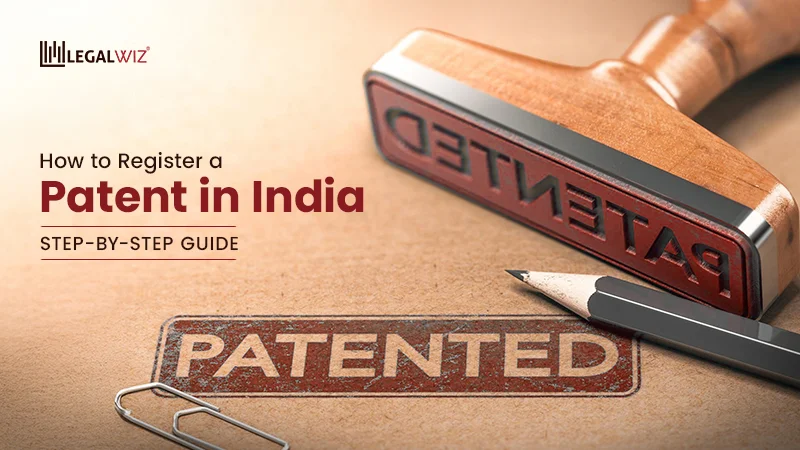Trademark Class 22: Ropes, Nets & Other Flexible Goods
If your business deals in utility ropes, cargo nets, packaging sacks, tarpaulins, or textile bags, you must register your brand under Trademark Class 22. This class includes flexible, non-metallic products used in packaging, transportation, agriculture, and outdoor applications.
Whether you’re producing bulk storage bags, fishing nets, or camping tents, securing your brand through trademark registration under Class 22 ensures long-term legal protection and product exclusivity.
Let’s explore what Trademark Class 22 includes, what it doesn’t, and how to register your brand effectively.
Understanding Trademark Classification in India
In India, trademarks are regulated by the Trade Marks Act, 1999, which empowers businesses to protect their brand names, logos, product lines, and other identifiers linked to specific goods or services.
To organize these rights, India follows the Nice Classification system, an internationally accepted framework that divides all goods and services into 45 trademark classes—Classes 1 to 34 for goods and Classes 35 to 45 for services.
Trademark Class 22 specifically covers ropes, cords, nets, tents, awnings, tarpaulins, sails, sacks, and flexible textile or plastic bags not otherwise classified.
What Products Can You Trademark Under Class 22?
Trademark Class 22 includes a wide range of non-metallic, non-rigid, and textile-based products used for packaging, storage, lifting, covering, and enclosing goods. These products are often used in agriculture, logistics, construction, shipping, and outdoor settings.
Here’s a detailed list of what’s covered under Trademark Class 22:
- Ropes and cords – including jute ropes, sisal ropes, elastic cords, and synthetic tying cords used for securing loads or agricultural purposes.
- Nets and mesh fabrics – Fishing nets, cargo nets, camouflage nets, and agricultural nets used for shade or protection.
- Sacks and bags for packaging – Gunny bags, grain sacks, bulk bags, and woven polypropylene sacks used in food, farming, and construction.
- Textile or plastic-based carry bags – Reusable shopping bags, garment bags, and tote-style sacks not classified under Class 18.
- Tents, awnings, and canopies – Used for camping, events, or temporary outdoor shelter.
- Tarpaulins and covers – Waterproof textile sheets used to cover goods, vehicles, or construction sites.
- Padding and stuffing materials (not of rubber or plastic) – For use in packaging, insulation, or cushioning.
- Sails and rigging products – Sails for boats, yacht covers, and rigging ropes.
Explore the Complete List of Products Classified Under Trademark Class 22
Browse this simplified list to check whether your textile bags, nets, ropes, or outdoor utility products are protected under Trademark Class 22.
Use the search function on your device to quickly locate your product and confirm its classification before filing your trademark application.
| Class | Term |
|---|
Looking for the right trademark class for your product? Check out our detailed article on choosing the appropriate class for trademark registration to identify the best fit for your product.
What Is Not Included in Trademark Class 22?
While Trademark Class 22 covers a wide range of textile-based ropes, nets, sacks, and packaging bags, some products are commonly misclassified due to overlapping uses or appearances.
Here are examples of what is not included in Class 22, with correct classifications and justifications:
- Leather bags, travel bags, and fashion accessories fall under the trademark class for leather goods and handbags (Class 18). These are considered personal accessories, not industrial or utility packaging.
- Plastic containers and household storage boxes are classified under the trademark class for household and kitchenware (Class 21), since Class 22 only includes flexible, non-rigid sacks or bags, not structured containers.
- Metal chains, cargo hooks, or lifting devices fall under thetrademark class for metal goods (Class 6), as they are metallic fastening or lifting tools, not rope-based accessories.
- Insulation padding or foam materials used for thermal or sound protection are classified under thetrademark class for rubber and plastics (Class 17), not stuffing materials under Class 22.
- Camping furniture or inflatable mattresses belong to thetrademark class for furniture and furnishings (Class 20), not Class 22, even if they are used outdoors.
Determining the exact trademark class for your product can be tricky, especially when items overlap in function. If you’re unsure where your goods fit, use our Trademark Class Search Tool to find the right match and avoid rejection or delays.
Intellectual Properties You Should Trademark Under Class 22
If you manufacture or sell ropes, nets, textile sacks, or packaging bags, registering your brand under Trademark Class 22 is essential to safeguard your intellectual property from misuse in both B2B and consumer markets.
Here’s what you should trademark:
- Company Name – Trademark your official business name (e.g., “AgroNet Solutions Pvt. Ltd.”) to protect your identity in the packaging or rope-making industry.
- Brand Name – Secure product branding like “FlexiWrap,” “PolyTex,” or “AquaNet” used on sacks, bags, or nets.
- Product Series or Line Names – Protect specific lines like “SecureLift Cargo Nets” or “EcoSack Reusable Bags.”
- Logos or Symbols – Register any distinct visual design, icon, or pattern featured on your packaging or tags.
- Slogans or Taglines – Phrases like “Strong. Sustainable. Secured.” or “Built to Carry the Load” can help distinguish your products and boost recall.
Protecting these brand elements helps you build credibility, prevent duplication, and maintain a strong brand presence across wholesale, industrial, and export markets.
List of Popular Brands Registered Under Class 22
Several established brands in the packaging, rope, textile, and outdoor equipment sectors have secured trademarks under Trademark Class 22 to protect their identity and product lines in competitive industrial and agricultural markets.
Here are a few examples:
- Garware Technical Fibres – A leading manufacturer of fishing nets, sports nets, and agri-protection solutions.
- SRF Limited – Known for industrial and packaging fabrics, including cargo securing systems and protective covers.
- Tufropes – Specializes in synthetic ropes and twines used in marine, defense, and utility sectors.
- Shalimar Wires – Offers industrial meshes and netting for filtration and screening applications.
- Ecobags India – Manufacturer of eco-friendly textile shopping bags, sacks, and custom-printed packaging.
- Tarpaulin House – Sells high-quality tarpaulins, awnings, and outdoor protective covers for industrial and agricultural use.
- Anchor Cords – Popular brand for utility ropes, cords, and slings used in logistics and general use.
Why Register Your Trademark Under Class 22?
In sectors like agriculture, transport, packaging, and logistics, product strength and reliability are tied closely to brand perception. Registering your trademark under Class 22 ensures your business maintains legal control over its identity in these competitive industries.
Key Benefits for Rope, Sack & Utility Bag Brands
- Exclusive Legal Rights Over Brand Elements
Gain ownership of your business name, product line, logo, or tagline used on ropes, nets, tents, or sacks. - Protection From Imitation and Counterfeiting
Ensure others cannot copy or register deceptively similar marks that could mislead your customers. - Trusted Branding for Tendering and Export
A registered mark enhances credibility during vendor selection, international partnerships, and trade compliance. - Consistency Across Product Lines
Secure protection as you introduce new packaging bags, utility items, or netting variations under the same brand. - Boost Brand Equity for Future Licensing or Franchising
A registered trademark builds long-term commercial value and unlocks monetization opportunities.
If you’ve read this far, you likely know if your product falls under Class 22. If it does, now’s the perfect time to take the next step—apply for trademark registration today with expert guidance from LegalWiz.
Still evaluating your next steps? These resources will help you make an informed decision:
- When and why you should trademark a name
- What can be registered as a trademark
- Different types of trademarks in India
- Trademark registration fees and costs in India
- Documents Required for Trademark Registration in India
10,000+ Brands Trust LegalWiz.in for Trademark Protection
From textile sack manufacturers and rope producers to netting solution providers and tarpaulin exporters, LegalWiz.in has helped thousands of Indian businesses register and protect their brands under the correct trademark class.
Whether you’re expanding into new markets, exporting utility bags, or introducing eco-friendly packaging lines, our team ensures your Trademark Class 22filing is precise, compliant, and fully digital.
With expert guidance, simplified documentation, and complete legal support, we make trademark registration seamless, so your brand stays protected while you grow.
Why Choose LegalWiz.in for Your Trademark Registration?
Here’s why businesses across the packaging, marine, agriculture, and logistics industries trust us:
- Correct Class Filing – Our experts help ensure your products are registered under the right class, avoiding misclassification.
- 100% Online Process – Register your trademark digitally from anywhere in India.
- Affordable Pricing – Transparent, fixed-fee plans suitable for MSMEs, startups, and exporters.
- End-to-End Legal Support – From name search to filing, objection handling, and renewal.
- Pan-India Brand Trust – Serving businesses across production, retail, and creative sectors with reliable trademark solutions.
Frequently Asked Questions
Is Trademark Class 22 suitable for packaging bags?
Yes. Class 22 includes textile or plastic-based sacks, bulk bags, and packaging bags, especially those used in agriculture, transport, or logistics. Fashion bags are filed under Class 18.
Are tarpaulins and tents part of Class 22?
Yes, tarpaulins, awnings, and camping tents are all included under Trademark Class 22.
What’s the difference between Class 22 and Class 18 for bags?
Class 22 covers utility sacks and non-personal textile bags used for packaging or industrial use. Class 18 includes handbags, purses, and travel bags used for fashion or personal travel.
Do I need to register ropes and nets separately?
No. As long as they fall under Class 22 and are used under the same brand, a single trademark registration can cover multiple products.
What happens if I file under the wrong class?
If you choose the wrong trademark class, your application may still get processed, but your trademark won’t be legally protected for the relevant goods or services. This means others could legally use a similar mark in that correct class, and you wouldn’t have grounds to stop them. Moreover, trademark fees are non-refundable, so you’d have to file a new application in the correct class and pay the fees again.
How long does registering a trademark take?
Trademark registration in India typically takes 6 months to 2 years, depending on any objections or third-party opposition. For a detailed overview of the process, read our complete guide on trademark registration process in India.
How long is my trademark valid, and how often should I renew it?
In India, a registered trademark is valid for 10 years. You must renew it every 10 years—either within 6 months before or after expiry—to maintain your rights.
Can I register a trademark before launching the product?
Yes, you can file based on intended use. You’ll need to show your bona fide intent to use the mark commercially.
What if someone infringes on my trademark?
Consult a trademark expert immediately. Legal remedies can include cease-and-desist notices or initiating infringement proceedings.

Amisha Shah
Amisha Shah heads content at LegalWiz.in, where she transforms complex legal concepts into clear, actionable insights. With extensive experience in legal, fintech, and business services, she helps startups and enterprises navigate regulatory challenges through engaging, accurate content that empowers informed business decisions.







